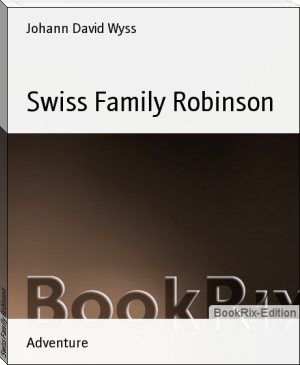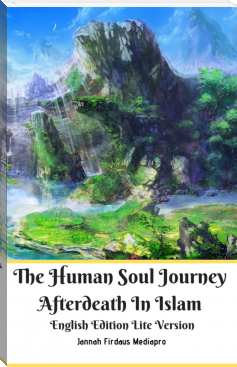Swiss Family Robinson - Johann David Wyss (poetry books to read txt) 📗

- Author: Johann David Wyss
- Performer: -
Book online «Swiss Family Robinson - Johann David Wyss (poetry books to read txt) 📗». Author Johann David Wyss
completely head over heels, frightening him nearly out of his
wits.
Jack did not long yield either to fear or anger, he presently
recovered himself, the dogs seemed to ask pardon by vehemently
licking his face and hands, and so, seizing the larger by the
ears, he jumped on his back, and, to my great amusement, coolly r
ode to meet me as I came up the hatchway. I could not refrain
from laughing at the site, and I praised his courage, but warned
him to be cautious and remember that animals of this species might,
in a state of hunger, be dangerous.
When we reassembled in the cabin, we all displayed our treasures.
Fritz brought a couple of guns, shot belt, powder-flasks, and
plenty of bullets.
Ernest produced a cap full of nails, a pair of large scissors,
an axe, and a hammer, while pincers, chisels and augers stuck
out of all his pockets.
Even little Franz* carried a box of no small size, and eagerly
began to show us the `nice sharp little hooks’ it contained.
His brothers smiled scornfully.
* Some editions translate this to Francis,
apparently to avoid confusion with Fritz.
I see no reason for the change, and am
retaining the original spelling. Ed.
`Well, done, Franz!’ cried I, `these fish hooks, which you the
youngest have found, may contribute more than anything else in
the ship to save our lives by procuring food for us. Fritz and
Ernest, you have chosen well.’
`Will you praise me too?’ said my dear wife. `I have nothing to
show, but I can give you good news. Some useful animals are still
alive: a donkey, two goats, six sheep, a ram, and a cow and a
fine sow both big with young. I was but just in time to save
their lives by taking food to them. The goats I milked, though
I do not know how I shall preserve the milk in this dreadful heat.’
`All these things are excellent indeed,’ said I, `but my friend
Jack here has presented me with a couple of huge hungry useless
dogs, who will eat more than any of us.’
`Oh, papa! They will be of use! Why, they will help us to hunt
when we get on shore!’
`No doubt they will, if ever we do get on shore, Jack; but I
must say I don’t know how it is to be done.’
`Can’t we each get into a big tub, and float there?’ returned he.
`I have often sailed splendidly like that, round the pond at home.’
`My child, you have hit on a capital idea,’ cried I. `That is
certainly worth trying. Now, Ernest, let me have your tools,
hammers, nails, saws, augers, and all; and then make haste to
collect any tubs you can find!’
We very soon found four large casks, made of sound wood and
strongly bound with iron hoops; they were floating with many
other things in the water in the hold, but we managed to fish
them out, and place them on the lower deck, which was at that
time scarcely above water. They were exactly what I wanted, and
I succeeded in sawing them across the middle. Hard work it was,
and we were glad enough to stop and refresh ourselves with goat’s
milk, wine,* and biscuits.
* Even as late as this book was written, public
water was likely to be polluted. Children as well
as adults drank alcoholic beverages, often
considerably diluted with water, because it had
been observed that children who did not drink
plain water were more likely to survive childhood.
My eight tubs now stood ranged in a row near the water’s edge,
and I looked at them with great satisfaction; to my surprise,
my wife did not seem to share my pleasure!
`I shall never,’ said she, `muster courage to get into one
of these!’
`Do not be too sure of that, dear wife; when you see my contrivance
completed, you will perhaps prefer it to this immovable wreck.’
I next procured a long thin plank on which my tubs could be fixed,
and the two ends of this I bent upwards so as to form a keel.
Other two planks were nailed along the sides of the tubs; they,
also being flexible, were brought to a point at each end, and
all firmly secured and nailed together, producing a kind of
narrow boat, divided into eight compartments, which I had no
doubt would float adequately in calm water. But when we thought
all was ready for the launch, we found, to our dismay, that the
grand contrivance was so heavy and clumsy that even our united
efforts could not move it an inch.
`I must have a lever,’ cried I. `Run and fetch the capstan bar!’
Fritz quickly brought one and, having formed rollers by cutting
up a long spar, I raised the forepart of my boat with the bar,
and my sons placed a roller under it.
`How is it, father,’ inquired Ernest, `that with that thing you
alone can do more than all of us together?’
I explained, as well as I could in a hurry, the principle of
Archimedes’ lever; from which he said he could move the world
if he had a point from which his mechanism might operate, and
promised to have a long talk on the subject of mechanics when
we should be safe on land.
I now made fast a long rope to the stern of our boat, attaching
the other end to a beam; then placing a second and third roller
under it, we once more began to push, this time with success, and
soon our gallant craft was safely launched: so swiftly indeed did
she glide into the water that, if the rope had not been well
secured, she would have passed beyond our reach. The boys wished
to jump in directly; but, alas, she leaned so much on one side
that they could not venture to do so.
Some heavy things being thrown in, however, the boat righted
itself by degrees, and the boys were so delighted that they
struggled which should first leap in to have the fun of sitting
down in the tubs. But it was plain to me at once that something
more was required to make her perfectly safe, so I contrived
outriggers to preserve the balance, by nailing long poles across
at the stem and stern, and fixing at the ends of each empty
brandy cask.
Then, the boat appearing steady, I got in; and turning it towards
the most open side of the wreck, I cut and cleared away
obstructions, so as to leave a free passage for our departure,
and the boys brought oars to be ready for the voyage. This
important undertaking we were forced to postpone until the
next day, as it was by this time far too late to attempt it.
It was not pleasant to have to spend another night in so precarious
a situation; but, yielding to necessity, we sat down to enjoy a
comfortable supper, for during our exciting and incessant work
all day we had taken nothing but an occasional biscuit and a
little wine.
We prepared for rest in a much happier frame of mind than on the
preceding day, but I did not forget the possibility of a renewed
storm, and therefore made every one put on the belts as before.
I persuaded my wife (not without considerable difficulty), to
put on a sailor’s dress, assuring her she would find it much
more comfortable and convenient for all she would have to go
through.
She at last consented to do this, and left us for a short time,
reappearing with much embarrassment and many blushes, in a most
becoming suit, which she had found in a midshipman’s chest.* We
all admired her costume, and any awkwardness she felt soon
began to pass off; then we retired to our hammocks, where peaceful
sleep prepared us all for the exertions of the coming day.
* At the time this book was written, women always
wore long skirts. A woman wearing trousers would
be considered so shocking that if she were so garbed
on a public street she would probably be arrested
for indecency.
We rose up betimes, for sleep weighs lightly on the hopeful as
well as on the anxious. After kneeling together in prayer, `Now
my beloved ones,’ said I, `with God’s help we are about to effect
our escape. Let the poor animals we must leave behind, be well
fed, and put plenty of fodder within their reach: in a few days
we may be able to return, and save them likewise. After that,
collect everything you can think of which may be of use to us.’
The boys joyfully obeyed me; and I selected, from the large
quantity of stores they got together, canvas to make a tent,
a chest of carpenter’s tools, guns, pistols, powder, shot,
and bullets, rods and fishing tackle, an iron pot, a case of
portable soup and another of biscuit. These useful articles of
course took the place of the ballast I had hastily thrown in
the day before; even so, the boys had brought so many things
that we were obliged to leave some of them for a future trip.
With a hearty prayer for God’s blessing, we now began to take
our seats, each in his tub. Just then we heard the cocks begin
to crow and the chickens to cackle, as though to reproach us
for deserting them.
`Why should not the fowls go with us!’ exclaimed I. `If we find
no food for them, they can be food for us!’ Ten hens and a couple
of cocks were accordingly placed in one of the tubs, and secured
with some wire-netting over them.
The ducks and geese were set at liberty, and took to the water at
once, while the pigeons, rejoicing to find themselves on the wing,
swiftly made for the shore. My wife, who managed all this for me,
kept us waiting for her some little time, and came at last with a
bag as big as a pillow in her arms. `This is my contribution,’
said she, throwing the bag to little Franz, to be, as I thought,
a cushion for him to sit upon, or to protect himself from being
tossed from side to side.
All being ready, we cast off, and moved away from the wreck. My
good, brave wife sat in the first compartment of the boat; next
her was Franz, a sweet-tempered, affectionate little boy, nearly
six years old. Then came Fritz, a handsome, spirited young fellow
of fourteen; the two centre tubs contained the valuable cargo;
then came our bold, thoughtless Jack, ten years old; next him
twelve-year-old Ernest, my second son, intelligent, well-informed,
and rather indolent. I myself, the anxious, loving father, stood
in the stern, endeavouring to guide the raft with its precious
burden to a safe landing-place.
The elder boys took the oars; everyone wore a float belt, and
had something useful close to him in case of being thrown into
the water.
The tide was flowing, which was a great help to the young oarsmen.
We emerged from the wreck and glided into the open sea. All eyes
were strained to get a full view of the land, and the boys pulled
with a will; but for some time we made no progress, as the boat
kept turning round and round, until I hit upon the right way to
steer it, after which we merrily made for the shore.
We had left the two dogs, Turk and Juno, on the wreck, as being
both large





Comments (0)